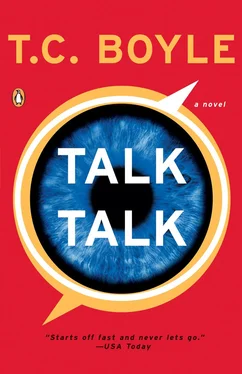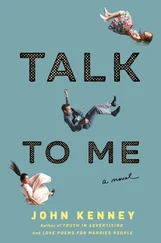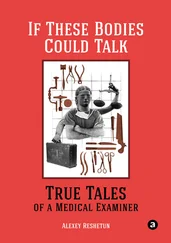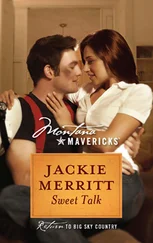“Us?” Now she went cold, but it was a steadily blowing crystalline kind of cold, and her fear was gone. She made the argument for its own sake. “But what about the police? Shouldn't we just give them the information?”
He gave her a look of disgust. “The police? Right, yeah. And go through the same kind of crap we did back in San Roque? Plus, what if he “is” planning to light out for the”-it took her a minute to catch this-“territories? To”-he finger-spelled it-“Poughkeepsie or wherever? Or what if this isn't even his house?” He didn't blink. Just stared into her eyes, earnest, angry, fired up, all his frustration, his attitude, his “love” come boiling to the surface. But was it love? Or was it just some twitch of the male ego, the need to go mano a mano, the testosterone speaking?
No matter. She wasn't going to think past the moment. She had an address and there was a thief hiding behind it. Even as she twisted the key to turn the engine over and grind the starter-and here Bridger provided the ears for her and the facial expression too-she knew she was going to chase this thing down till there was nowhere left to go.
The fog on the hills had an apocalyptic look, as if it were composed of some fatal gas poised to descend over the trees and rob the breath of every living thing, and yet the sun was still high and vital and the breeze untainted. On another day, in another mood, she might have found the fog a palliative, the cornerstone of the Bay Area's charm, but not today, not now. It was five o'clock. They'd gone to Noah's Bagels for lunch, though she wasn't hungry (or she was, but when the food arrived she found she couldn't eat), and that had given them some time to decompress and think out their next move. Or at least consider it, because they both knew that nothing was going to stop them from driving over to Shelter Bay Village, a mere five minutes away. But then what? Would they confront him? Call 911? Knock him down and bind him up themselves?
What they decided, finally, was to reconnoitre the place (scope it out, as Bridger would say, and she had to assume the phrase derived from “telescope” in some way, but then wouldn't it have been more accurate to say “binoc it out”?), just to see what they could see. Now they were here, in front of a recessed bank of semi-detached redwood condominiums constructed to maximize the views, strolling hand in hand along the gravel path that edged the water in a gently sweeping arc beneath a promenade of palms. And yes, those were binoculars dangling from her neck, and if anyone were to ask, well, she was just another innocuous and slightly dotty birdwatcher, and wasn't that a great blue heron out there? And look at the egrets!
Bridger's eyes were fixed on the deck of the near building, the one they'd identified from the front as #109. Was there movement there? He touched her arm and she lifted the binoculars to her eyes, trying to be discreet. At first she saw nothing, sheets of light glancing off the big flat opaque windows till they went from silver to black, and then she recalibrated and a figure materialized before her, the figure of a woman hovering over a glass-topped table. A young woman. Pretty features, dark hair wound up in a coil at the crown of her head, blue top, black capris. She was wiping down the table, that was it, and now-suddenly, heart pounding, Dana swung the binoculars away and pointed a finger out over the water, as if she'd been tracking the descent of a flock of mergansers-the woman was staring right at her.
Dana felt Bridger's hand go to the binoculars and she let go of them-he was playing the mime too, jerking the instrument back and forth as if following the imaginary birds, but what his lips said was, “Who is that? The wife, you think?”
Still focused on the patch of water that lay just beyond the faded redwood deck of #109, she could only nod. “I guess,” she said. “If this is the right place.”
Bridger's eyes shot to the deck and then went back to the binoculars. “Did you see anyone else? A man? Is “he” there?”
In the end, the tension was too much for her to bear. She gently extracted the binoculars from his grip, let her gaze rove over the surface of the bay a moment, and then swung him round by one arm and led him off in the opposite direction, two bird lovers on the track of something elusive. When they'd gone fifty paces, she leaned into him and they both halted, looking out to the water. “What now?” she asked, and if she could have heard herself-if she were a character in a novel-she might have described her tone as forlorn. Certainly she felt that way. The woman had looked right at her-or had seemed to. There was a face to it now, another face, flesh and blood, dark eyes, dark hair, capris.
Bridger loomed into her field of vision. “I say we ring the doorbell.”
He was right. She knew he was. “Couldn't we just… wait? To see, I mean. If he shows up, gets out of his car-we could see his car and get the license plate…”
“And then what?” His mouth was drawn so thin it was like a paper cut. He was determined, she could see that. A breeze came up then, clean and sweet, and blew the hair across her face so that for a moment she was hidden and what he said next didn't register. But his fingers were there, gently probing, and he brought her back with a sweep of his hand. “Come on,” he urged. “We'll go together. Just ring the bell, that's all. We're visiting. Looking for the Goldsteins. Ask her do you know where the Goldsteins live and just see what happens, see if the son of a bitch is there-maybe he'll answer the door himself, and that's all we need. Just that.”
She didn't argue. All at once they were strolling again, following the gravel path as it looped back across the gentle grassy undulations and neatly recessed flowerbeds the landscaper had thought to provide so the denizens of Shelter Bay Village could delight in the contrast as they gazed out over the property to the flat shining void of the water and the hills beyond. A woman in jeans and a windbreaker emerged from behind the bank of buildings and jogged toward them, a small black dog scrambling ahead of her on the tether of its leash. Someone was getting out of a car in the lot-another woman, dipping forward to retrieve her purse and a bag of groceries. Dana felt as if she were about to lose consciousness. Something flitted before her eyes, but it wasn't palpable, and then they were on the doorstep-a deep-pile mat, two pots of begonias, brass knocker-and she was glad she couldn't hear the sound the buzzer made in response to the weight of Bridger's index finger.
The door pulled abruptly open and the woman was there, prettier even than she'd looked at a distance, and there was a child there too, four or five years old, a girl, tugging with all her weight at her mother's wrist-her mother, this was her mother, and anybody could have seen that. The woman gave them a blank look. “Yes?” she said. “Can I help you?”
Bridger said something then and for a moment it seemed to immobilize her: “Is Dana here?”
The child kept tugging, chanting “Mommy, Mommy,” and something else Dana couldn't read, and the woman's face changed in that instant, the eyes retreating, lips hardening round the bitter savor of the lie. “No,” she said, “you must have the wrong house.” She glanced away to shoot her daughter an admonitory look and then came back to them. “There is no one of that name here.”
“WHAT DO YOU MEAN they asked for me? By “name”?”
He'd just come through the front door, feeling harassed, his shirt soaked under the arms, and he hadn't had a drink yet or anything to eat either and the first thing she said to him was that somebody had been there looking for him. That snapped him to attention, all right. That froze him. Right there in the front hall, the three white plastic bags of takeout Chinese dangling from his fingertips and the unread newspaper pinned to his chest. He'd spent the better part of the afternoon and well into the evening hassling over things, the little details that prick you like multiple beestings till your flesh is scored and bleeding and you barely have the energy or will to do what you have to do-like take three carloads of Natalia's clothes and accessories to the storage unit in Larkspur she'd insisted on renting and FedEx six cardboard cartons of dresses, handbags, shoes and kiddie toys to Sandman's place in Croton-and now she'd sprung this on him. He stood there, stupefied.
Читать дальше












